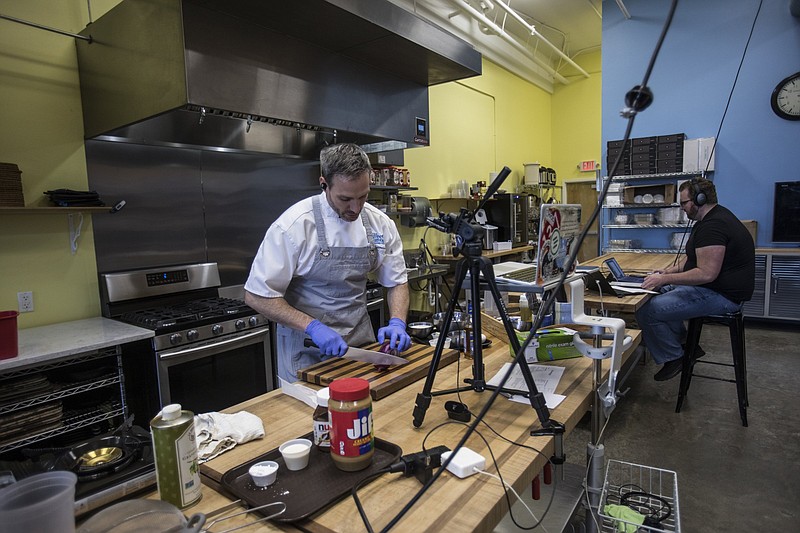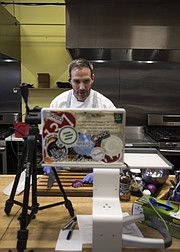Their business brought people together to celebrate the art and pleasure of cooking in a shared space where they prepared meals with the help of a professional chef.
What could go wrong?
"We went to a hard stop in the blink of an eye," says Jeff Pennypacker, who owns the Sweet and Savory Classroom on Chattanooga's Southside with his wife and fellow chef, Heather. "In one week, every single private event canceled."
Across industries and communities, businesses built on individual interaction and shared experiences have been forced to close down the in-person element of their operations. For some, that has meant exploring ways to deliver those experiences online - ready or not.
Laurie Stevens, the owner of the Chattanooga School of Language, had been thinking about expanding her entirely in-person classes to add an online element.
"I had wanted to do online classes earlier this year to try and expand our market, but I didn't feel like I had it all together," Stevens says. "We had explored it. Now we're there."
At the Sweet and Savory Kitchen, the shift away from in-person, hands-on cooking came as the business was delivering promising growth. Sweet and Savory had expanded steadily since the Pennypackers opened it in January 2016, and March 2020 was shaping up to deliver 30% more business than the year before.
"We had lots of private events, and we were hitting new record numbers," Pennypacker says.
Once the coronavirus pandemic took hold, the business briefly went to reduced class sizes and expanded space between clients, limiting classes to 10 rather than the usual 28. But they quickly realized even that wasn't going to work in the new world, Pennypacker says.
"The wise thing to do was to go ahead and close the doors," he says.
The Pennypackers started offering carryout meals to try to maintain a thin stream of revenue, but they also wondered if online cooking classes through the Zoom platform might be a way to preserve the experience and the community they had worked so hard to build.
"I realized we could do it with cell phones and laptops, and we were Zooming the next weekend," Pennypacker says. "I was a little hesitant putting a lot of energy into it because I didn't know if anything would come of it, but it worked."
Classes that used to cap at 28 can now accommodate far more students, and Pennypacker has had as many as 121 logged in to cook along with him from all over - and even outside of - the country. Folks gather around the computer, crack a bottle of wine and turn the class into a family event, he says.
The per-person, in-person price point of $70 is cut to anywhere from $14 to $50, based on whether customers shop for ingredients or pick them up ready to cook. Once the world returns to something like normal, Pennypacker anticipates he'll continue the virtual aspect of the business, doubling up by offering online what he's also doing in person.
"I've been looking at doing the virtual classes from a live class," he says. "People have been telling me they'd love to keep doing this once we get back to whatever normal is."
For Stevens, the move to online classes came in the middle of a term when she had about 10 classes in half a dozen languages in progress, as well as private lessons and school programming - all happening in person.
"It didn't even really cross my mind to stop classes," she says. "We could continue teaching, so that's what we did. We wanted to continue to provide a service we had promised people."
A few people opted to call it quits and wait for the in-person classes to resume, but most were game to take their lessons online, Stevens says. Classes transitioned using Zoom, and Stevens quickly realized one of the biggest upsides of online learning.
"There are no geographical barriers," she says. "It's reaching new markets."
It's also easy, she added.
"There's a lot of convenience," Stevens says. "Grab a glass of wine or coffee or tea, grab your pet, wear your pajamas. Come as you are."
There are, however, some downsides to life online, Stevens added. Enrollment is down significantly since last year as some large, in-person programs have canceled, and it can be hard to read the room and react to student needs when the venue is virtual, she says.
"You do lose things - it's harder to have that personal interaction," she says.
But she's optimistic about the potential of blending the online and the in-person once people venture back out, Stevens says.
"You have to be ready for the increase in demand when the curve goes back up," she says.
For real estate agent Austin Sizemore, the advent of online work has changed his team's routines as well as the services they offer their customers.
"We moved our internal meetings to Zoom, and we're not meeting as often but we're getting more accomplished," he says.
Being able to record team meetings, one-on-ones and training sessions will make their onboarding of new employees more efficient, says Sizemore, who has four agents and two support staff members on his team.
Outside the office, some clients have been hesitant to tour homes or allow people into their homes to have a look, he says, so virtual tours have become an essential element that make up about half of his business these days.
His team has added a link on their website where clients can choose the virtual tour, and that's another case where the ability to record the walk-through is beneficial, he says.
"We can send them all the videos to look back through as they're making decisions," Sizemore says. "I do think moving forward we will continue to have that as a resource."
Clients are using the virtual option to shop, but they still want to see their top two or three choices in person, he says.
The owner of MurMaid Mattress is also leaning on online ordering to make up for some of the business he's lost as he has closed some showrooms and people have been less eager to shop in person.
"What this new world we're in has allowed us to take the next step and we are getting many more online orders," Roger Pickett says. "In the last two weeks, we've done more of that than we've done in two years. We hope to grow it and this is going to help catapult that for us."
As the community tries to recover from the economic hit delivered by the coronavirus crisis, Pickett says he hopes people will be inclined to support local businesses, and that online options will encourage that.
"I just want our local people to know that if they choose to buy online, they can still shop local."

